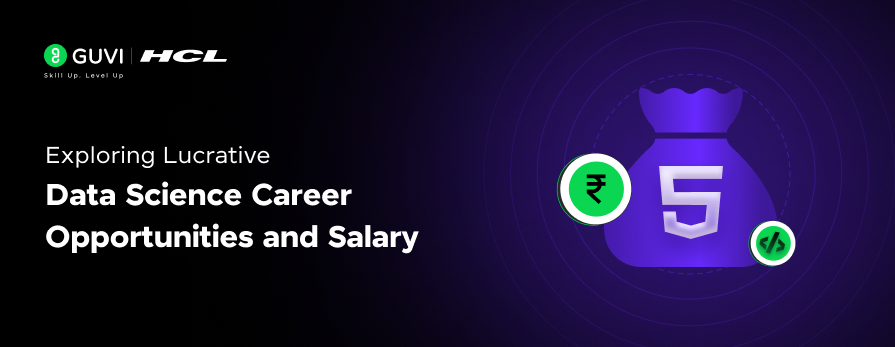
Exploring Lucrative Data Science Career Opportunities and Salary
Mar 05, 2025 5 Min Read 3699 Views
(Last Updated)
The world is abuzz with exciting data science career opportunities that offer both intellectual fulfillment and financial rewards. From its roots in analytics and statistics, data science has evolved into a discipline that drives decision-making, predicts future outcomes, and shapes the world we live in.
The applications of data science are far-reaching, extending beyond the realm of information technology to industries such as retail, finance, supply chain, entertainment, transport, and government.
In this article, we will delve into the world of data science, explore the top data science career opportunities, and uncover the skills required to thrive in this dynamic field.
Table of contents
- What is Data Science?
- Technical Skills for Data Scientists
- Programming Languages
- Platforms
- Data Visualization
- Machine Learning and AI
- Non-Technical Skills for Data Scientists
- Exploring Data Science Career Opportunities
- Data Architect and Administrators
- Data Engineer
- Data Analyst
- Data Scientist
- Machine Learning Engineer
- Statisticians and Mathematicians
- Business IT Analyst
- Marketing Analyst
- Clinical Data Managers
- How to Get Started with a Career as a Data Scientist
- Build a Strong Educational Foundation
- Develop Core Technical Skills
- Gain Hands-on Experience
- Learn Data Visualization & Business Understanding
- Take Online Courses & Certifications
- Network & Seek Internships
- Concluding Thoughts...
- FAQs
- Is data science a good career?
- Is data science a good career salary-wise?
- Is data science a stressful job?
- Does data science require coding?
- Can a fresher become a data scientist?
What is Data Science?
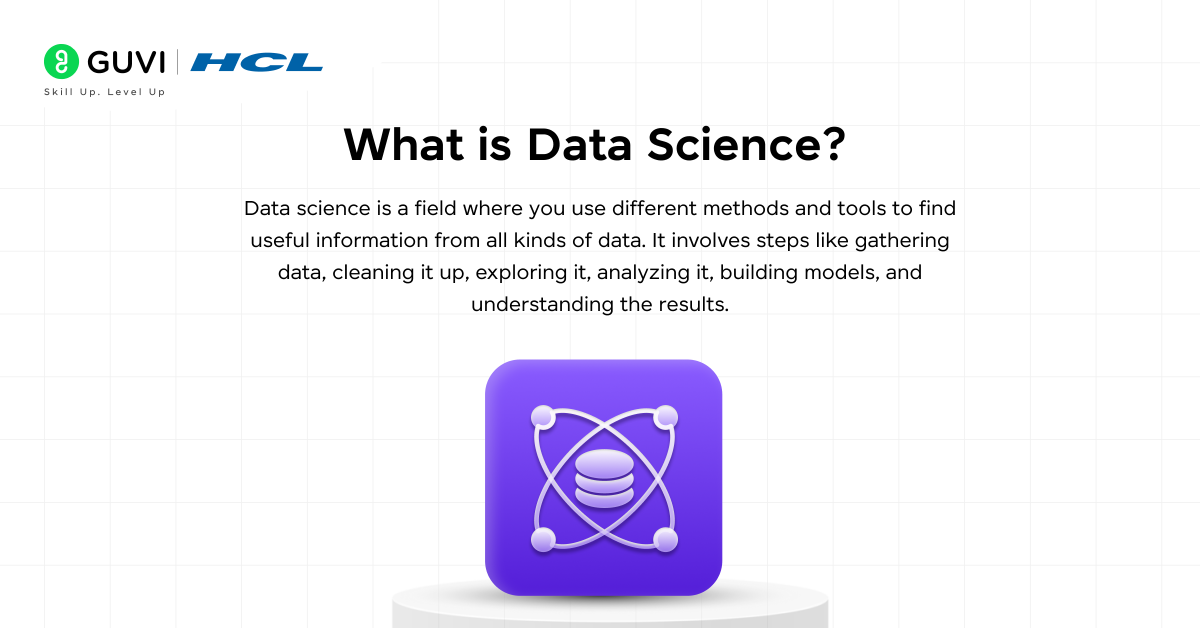
At its core, data science involves the utilization and preparation of data for analysis. In a world overflowing with data, the ability to clean and harness this data to make informed decisions is the essence of data science.
Data scientists employ sophisticated techniques to uncover patterns, extract insights, and enable business leaders to make data-driven decisions. For a more detailed understanding of the field, check out our comprehensive guide on what data science entails.
Technical Skills for Data Scientists
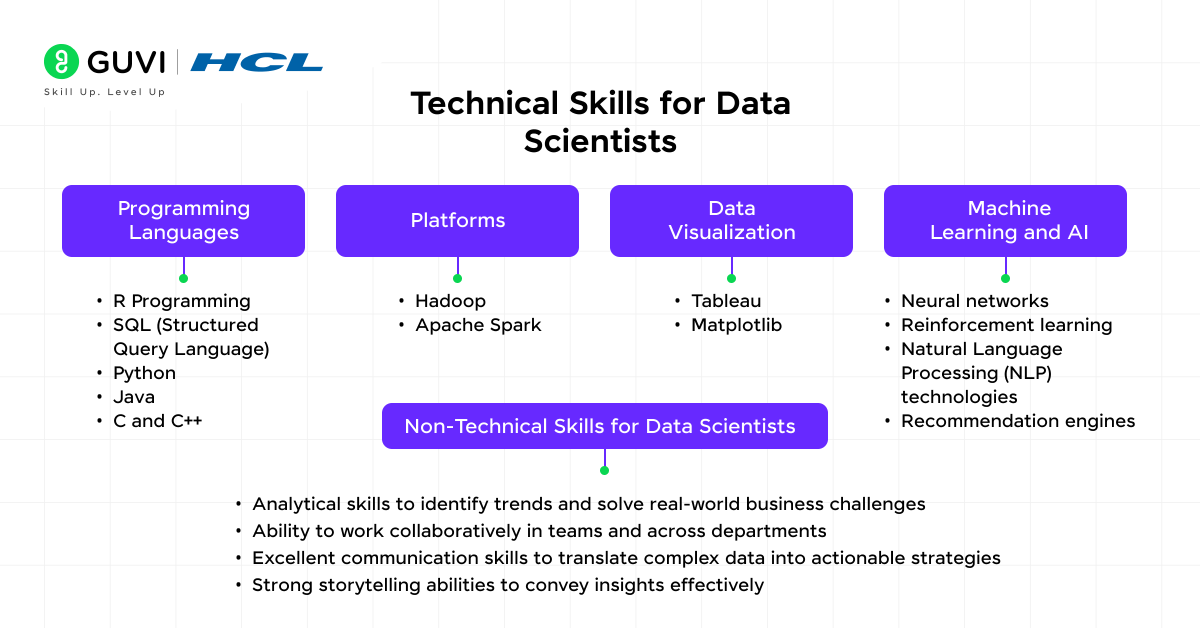
Data science professionals must continually learn new technologies, approaches, and the latest platforms for big data analysis. This ensures that they remain relevant in the ever-changing real-world landscape, equipped with practical knowledge and hands-on training.
Here are some of the key technical skills required for a successful data science career:
Programming Languages
- R Programming
- SQL (Structured Query Language)
- Python
- Java
- C and C++
Platforms
- Hadoop
- Apache Spark
Data Visualization
- Tableau
- Matplotlib
Machine Learning and AI
- Neural networks
- Reinforcement learning
- Natural Language Processing (NLP) technologies
- Recommendation engines
Non-Technical Skills for Data Scientists
While technical skills are essential for data scientists, non-technical skills play a crucial role in their success as well. Here are some of the non-technical skills that data scientists should possess:
- Analytical skills to identify trends and solve real-world business challenges
- Ability to work collaboratively in teams and across departments
- Excellent communication skills to translate complex data into actionable strategies
- Strong storytelling abilities to convey insights effectively
Exploring Data Science Career Opportunities
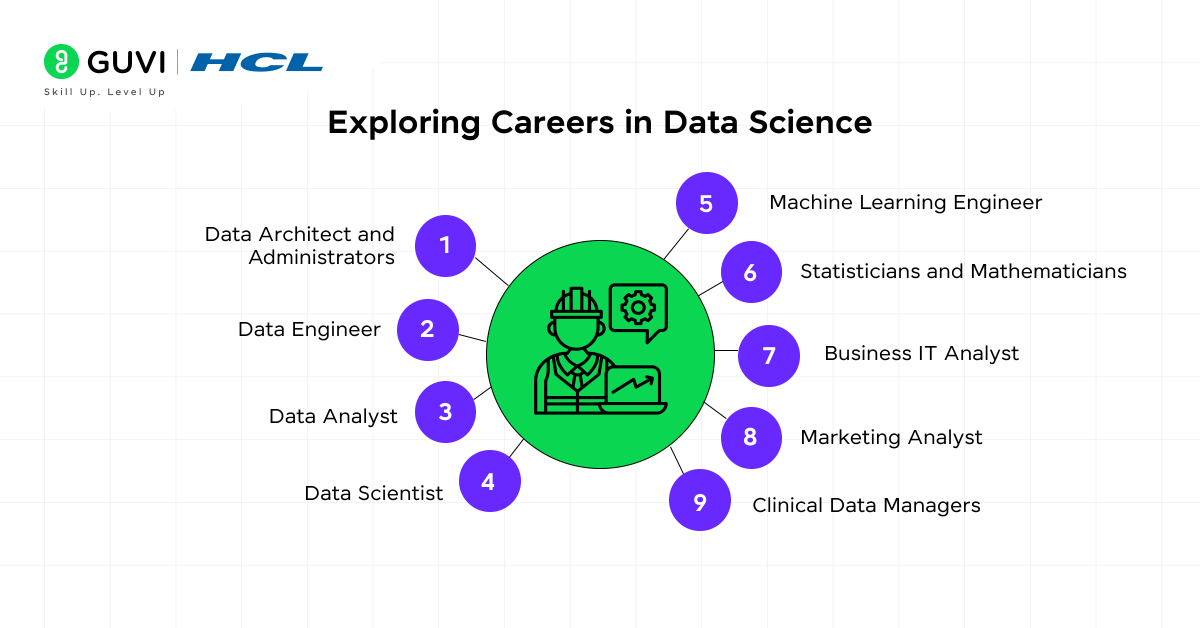
The field of data science offers a plethora of exciting career paths. Let’s explore some of the prominent roles within the data science domain:
1. Data Architect and Administrators
Average Annual Salary: ₹ 25.0 LPA
Data architects work closely with data engineers and are responsible for designing the data management framework for organizations. They create and enhance database systems, design data flows and processes, and work on data management strategies.
The demand for database administrators and architects is projected to grow significantly in the coming years, making this a promising career choice.
Skills Required for this Role:
- Database Design and Management: Proficiency in creating and managing database systems to ensure efficient data storage and retrieval.
- Data Modeling: Ability to design data models that accurately represent organizational data structures.
- ETL Processes: Expertise in Extract, Transform, Load (ETL) processes for integrating data from various sources.
2. Data Engineer
Average Annual Salary: ₹ 7.1 LPA
Data engineers are experts in processing vast amounts of real-time data. They play a vital role in technology-driven companies, interpreting unformatted and unverified data.
Data engineers are responsible for maintaining high data volumes and creating data pipelines for further analysis.
Skills Required for this Role:
- Programming Languages: Proficiency in languages such as Python, Java, or Scala for building data pipelines.
- Big Data Technologies: Experience with tools like Apache Hadoop, Spark, or Kafka for processing large datasets.
- Database Systems: Knowledge of SQL and NoSQL databases for data storage solutions.
3. Data Analyst
Average Annual Salary: ₹ 6.7 LPA
Data analysts work directly with raw data collected from various systems. They collaborate with multiple teams within an organization to process information and create reports using data visualization tools.
Data analysts are often the starting point for many data scientists, to gain valuable experience in data analysis and interpretation.
Skills Required for this Role:
- Statistical Analysis: Understanding of statistical methods to interpret data trends and patterns.
- Data Visualization: Proficiency in tools like Tableau, Power BI, or Excel to present data insights.
- Query Languages: Ability to use SQL for extracting and manipulating data from databases.
4. Data Scientist
Average Annual Salary: ₹ 9.2 LPA
Data scientists go beyond analyzing big data and focus on solving real-world business problems. They provide actionable insights, trends, and patterns across data to drive strategic business decisions.
Their expertise is highly valued by the C-Suite, as their insights directly impact the bottom line.
Skills Required for this Role:
- Machine Learning: Expertise in developing and applying machine learning models to solve complex problems.
- Programming Skills: Proficiency in Python or R for data analysis and model building.
- Statistical Knowledge: Deep understanding of statistical theories and methods.
- Data Wrangling: Ability to clean and preprocess data for analysis.
5. Machine Learning Engineer
Average Annual Salary: ₹ 6.2 LPA
Machine learning engineers combine software engineering and data science skills to work with big data on a daily basis. They develop ML models, AI systems, and software to drive various processes within organizations.
This role requires extensive experience and expertise in machine learning and software programming.
Skills Required for this Role:
- Algorithm Development: Skills in designing and implementing machine learning algorithms.
- Software Engineering: Strong background in software development practices for deploying scalable models.
- Deep Learning Frameworks: Experience with TensorFlow, Keras, or PyTorch for building advanced models.
6. Statisticians and Mathematicians
Average Annual Salary: ₹ 4.0 LPA
Statisticians and mathematicians play a crucial role in industries such as government, healthcare, and research and development. They analyze large volumes of numerical data, identify trends, and provide insights that inform decision-making and policies within organizations.
Skills Required for this Role:
- Mathematical Modeling: Proficiency in developing models to represent complex data relationships.
- Statistical Testing: Expertise in hypothesis testing and inferential statistics.
- Data Interpretation: Ability to draw meaningful conclusions from quantitative data analyses.
7. Business IT Analyst
Average Annual Salary: ₹ 7.1 LPA
Business analysts evaluate company processes, analyze industry trends, and identify opportunities for revenue growth. They process vast amounts of data and leverage business intelligence tools to develop strategies and improve business performance.
Skills Required for this Role:
- Business Analysis: Understanding of business processes and requirements gathering.
- Technical Proficiency: Knowledge of IT systems and how they support business objectives.
- Data Analysis: Ability to analyze data to inform business decisions.
- Project Management: Skills in managing IT projects to improve business operations.
8. Marketing Analyst
Average Annual Salary: ₹ 10.0 LPA
Marketing analysts play a vital role in identifying consumer behaviors and analyzing market trends. They access large amounts of data across multiple platforms to develop effective marketing strategies and evaluate marketing campaigns.
Skills Required for this Role:
- Market Research: Expertise in analyzing market trends and consumer behavior.
- Data Interpretation: Ability to interpret sales and marketing data to assess campaign effectiveness.
- Statistical Tools: Proficiency in using statistical software for data analysis.
- Reporting Skills: Capable of compiling reports that inform marketing strategies.
9. Clinical Data Managers
Average Annual Salary: ₹ 5.0 LPA
Clinical data managers combine healthcare expertise with data science skills to assimilate, analyze, and predict trends in the medical industry. They ensure data integrity and governance across clinical trials and research, contributing to advancements in healthcare.
Skills Required for this Role:
- Clinical Data Management: Expertise in handling clinical trial data and ensuring its integrity.
- Regulatory Knowledge: Understanding of regulatory requirements for clinical data.
- Data Analysis: Skills in analyzing clinical data to support research findings.
How to Get Started with a Career as a Data Scientist
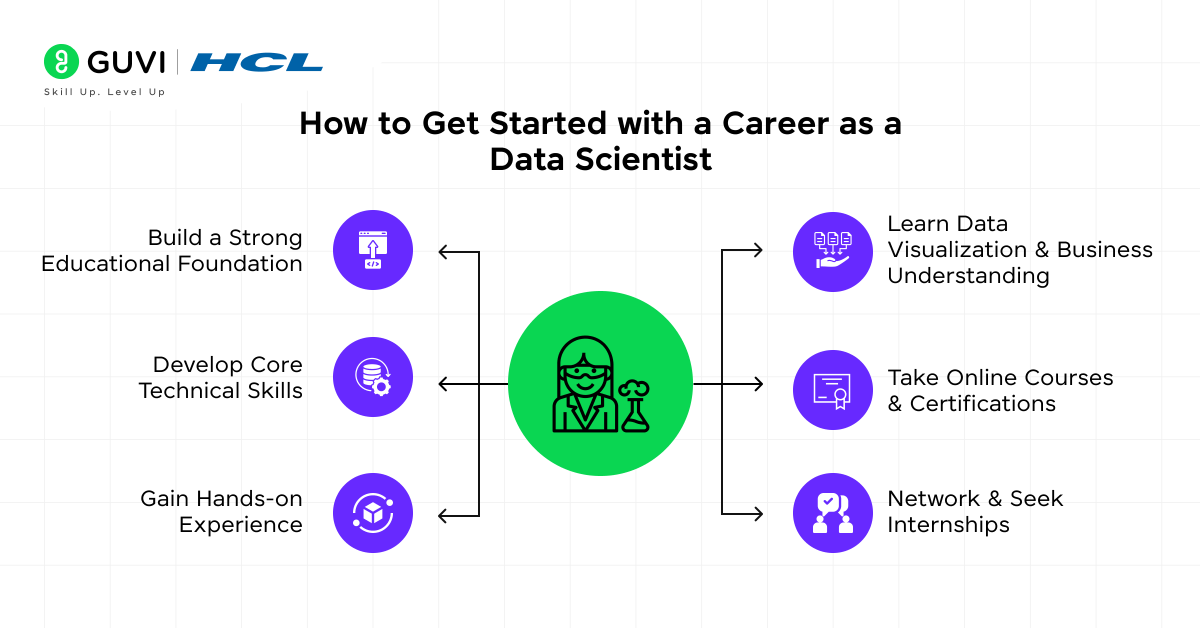
Becoming a data scientist requires a mix of technical skills, problem-solving abilities, and business acumen. Here’s a step-by-step guide to help you get started:
1. Build a Strong Educational Foundation
- Earn a bachelor’s degree in computer science, mathematics, statistics, data science, or a related field.
- Consider a master’s or certification program in data science, AI, or machine learning for more in-depth knowledge.
2. Develop Core Technical Skills
- Statistics & Mathematics: Understand probability, regression, hypothesis testing, and linear algebra.
- Data Manipulation & Analysis: Gain proficiency in Pandas, NumPy, and SQL for data handling.
- Machine Learning: Learn about supervised and unsupervised learning using libraries like Scikit-learn and TensorFlow.
- Big Data Tools: Understand how to use Hadoop, Spark, or cloud platforms like AWS or Google Cloud.
3. Gain Hands-on Experience
- Work on real-world projects using datasets from Kaggle, UCI Machine Learning Repository, or government datasets.
- Develop a portfolio showcasing projects involving data analysis, visualization, and machine learning models.
- Contribute to open-source projects or participate in hackathons.
4. Learn Data Visualization & Business Understanding
- Use tools like Tableau, Power BI, or Matplotlib to create insightful visualizations.
- Develop the ability to interpret business problems and align data-driven insights with business goals.
5. Take Online Courses & Certifications
- Enroll in platforms like GUVI, Coursera, or Udacity for structured learning.
- Obtain certifications such as:
- GUVI’s IIT-M Pravartak Data Science Course
- Google Data Analytics Certificate
- IBM Data Science Professional Certificate
- AWS Certified Machine Learning
6. Network & Seek Internships
- Connect with professionals on LinkedIn, attend webinars, and join data science communities.
- Apply for internships or entry-level jobs in data analysis or data science to gain industry experience.
If you want to learn more about data science and want to become one, consider enrolling in GUVI’s Data Science Course where you will master technologies like MongoDB, Tableau, PowerBi, Pandas, etc., and build interesting real-life projects along with industry-grade certificates.
Concluding Thoughts…
In summary, data science offers a wide range of lucrative career opportunities across various industries. Professionals with a passion for data, a strong analytical mindset, and a willingness to continually learn and adapt will thrive in this dynamic field.
With the demand for skilled data scientists on the rise, pursuing a career in data science can lead to exciting prospects and a fulfilling professional journey.
Remember, the salary of a data scientist can vary based on factors such as location, experience, and the type of company. The more experience and knowledge an employee brings to the table, the more value they can provide to an organization.
FAQs
Data science is a promising career choice. It combines statistical and analytical skills to derive insights from data, making it vital in various industries. High demand, lucrative salaries, and opportunities for growth make it attractive.
Data science is a lucrative and promising career option with high salary potential. As businesses increasingly rely on data-driven decisions, demand for skilled data scientists has surged.
Data science can be a stressful job due to the demanding nature of handling large datasets, tight deadlines, and complex problem-solving. Additionally, the continuous need to keep up with rapidly evolving technologies and methodologies adds pressure.
Yes, data science requires coding. Coding is an essential skill for data scientists to manipulate, clean, analyze, and visualize data efficiently. Python, R, and SQL are common programming languages used in data science for data handling and statistical analysis.
Yes, a fresher can become a data scientist with dedication and proper preparation. Acquiring a strong foundation in mathematics, statistics, and programming is crucial.















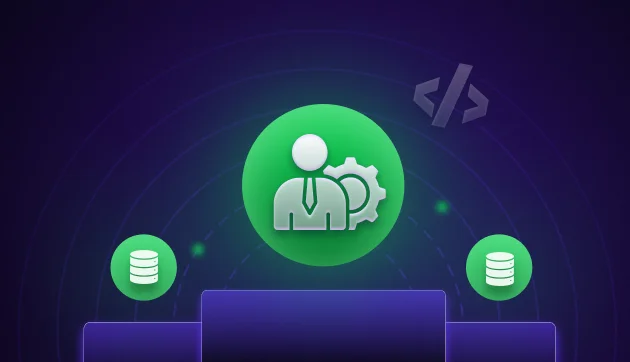
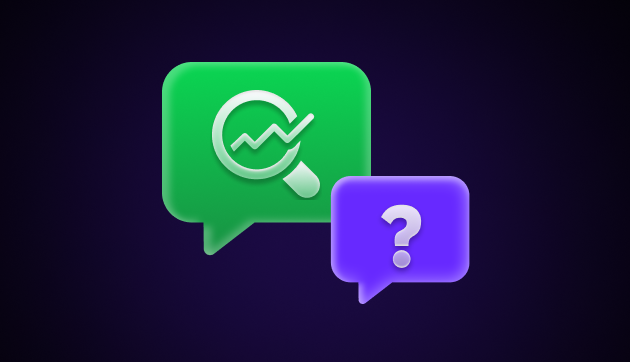
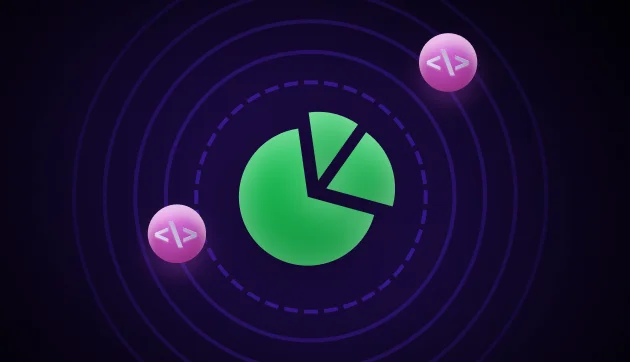


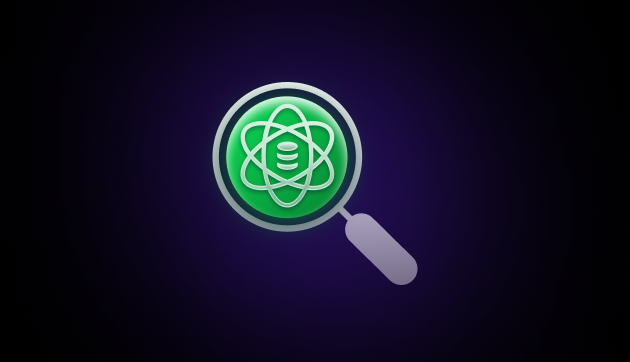


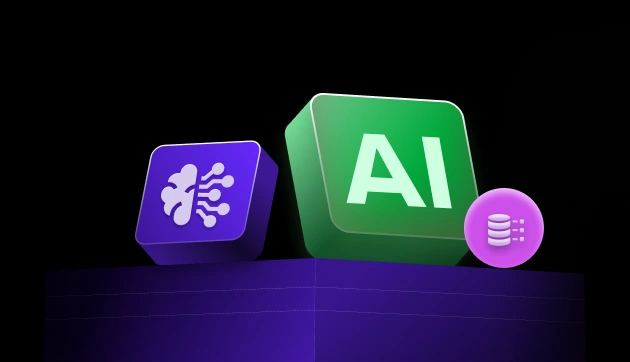

Did you enjoy this article?